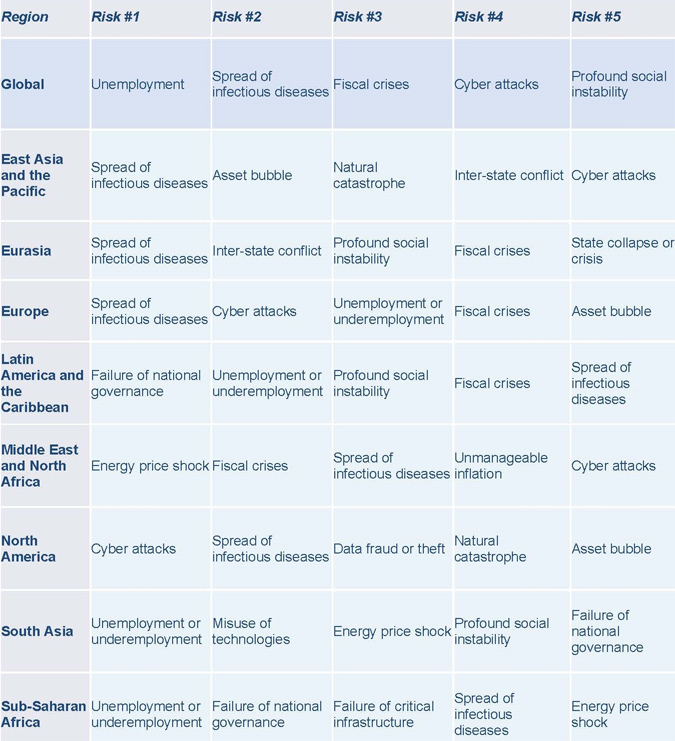Unemployment is now the ‘top risk’ for business leaders globally, according to the World Economic Forum (WEF). Its Regional Risks for Doing Business 2020 reveals that infectious diseases is the second top concern, after unemployment. However, fiscal crisis – last year’s top CEO concern – now ranks third.
Although the top risks are mostly related to economics, climate-related risks are also causing greater concerns for CEOs this year. Natural catastrophes, for example, has climbed up seven places, as has extreme weather events (up five). Additionally, biodiversity loss and ecosystem collapse (up eight) and failure of climate-change adaptation (up two) are also a worry. Human-made environmental catastrophes, failure of urban planning and terrorist attacks, however, have dropped substantially on this year’s “risk ratings”.
“Tackling the intersecting risks of pandemic, financial risks and climate change will be a cornerstone of the desired new normal,” stated Lee Hyung Hee President, Social Value Committee of SK Group. “The global pandemic has unleashed untold damage to our economies and societies. Business leaders in Asia have recognised that risk, with infectious diseases appearing as the number one risk for the region.”
RISK RESILIENCE STRATEGIES
“COVID-19 is distracting us from certain long-term risks that will be around long after the current crisis is resolved. But the pandemic is also having the positive effect of leading many to reassess priorities,” stated Peter Giger, Group Chief Risk Officer of Zurich Insurance Group. “This, I hope, will ensure that businesses advance their risk resilience strategies and result in decisive and impactful action to combat existential risks like climate change.”
John Doyle, President and Chief Executive Officer of Marsh & McLennan Companies, believes the Covid-19 crisis has shone a spotlight on organisational resilience. “As firms look to the future, they are matching their risk and resilience arrangements with a threat landscape marked by significant customer and workforce behavioural shifts. Just as economic and climate concerns will require firms to refocus business plans, a greater reliance on digital infrastructures will mean a marked increase in cyber risk exposures,” he noted. “To optimise recovery, organisations will need to build greater preparedness into their business models in order to be more resilient in the face of future disruptions.”

PANDEMIC DISRUPTIONS
The employment disruptions caused by the pandemic, rising automation and the transition to greener economies are “fundamentally changing labour markets”, added WEF’s Managing Director Saadia Zahidi. “As we emerge from the crisis, leaders have a remarkable opportunity to create new jobs, support living wages, and reimagine social safety nets to adequately meet the challenges in the labour markets of tomorrow.”
The findings of Regional Risks for Doing Business 2020 are based on a survey with over 12,000 business leaders from 127 countries. Regions surveyed for the interactive map include East Asia and the Pacific, Eurasia, Europe, Latin America and the Caribbean, Middle East and North Africa, North America, South Asia, sub-Saharan Africa. The survey pulls 30 risks, including terrorist attacks, extreme weather events and state collapse or crisis.
The report was developed in partnership with Marsh & McLennan Companies, Zurich Insurance Group and SK Group. It’s part of WEF’s Global Risks Initiative to analyse critical global risks and communicates them to stakeholders and the public. WEF has released the data ahead of its inaugural Jobs Reset Summit (20-23 October). This event aims to shape inclusive, fair and sustainable economies, societies and workplaces.







































